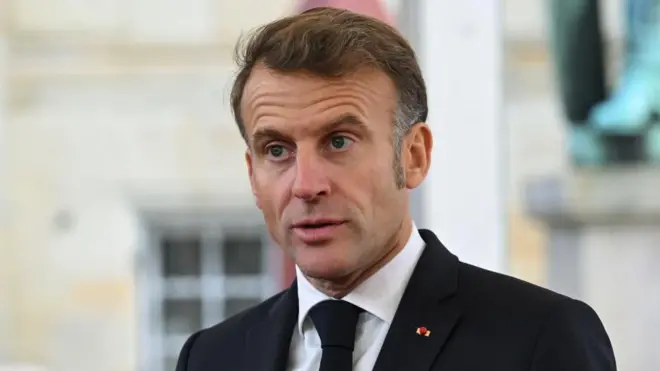After eight years at the helm, Emmanuel Macron finds his presidency under mounting strain as France sinks deeper into political turmoil.
Once proudly referring to himself as the maître des horloges — the master of the clocks — Macron’s once-precise control over political timing appears to be slipping. For the third time in just one year, one of his prime ministers has stepped down, and recent opinion polls reveal that nearly three-quarters of French citizens now believe he should resign as well.
Macron, however, has made it clear that he has no intention of leaving office early. France now waits anxiously to see whether he can form a new government — or if another dissolution of parliament is on the horizon.

The crisis escalated dramatically on Monday when Prime Minister Sébastien Lecornu announced his resignation — just 26 days after taking office.
But in a sudden reversal, he agreed to remain temporarily at Macron’s request, extending his tenure for another 48 hours — until Wednesday evening — in an attempt to broker “stability for the country” through last-ditch negotiations with rival political parties.
This twist added yet another layer to a saga that began with Macron’s decision to call a snap parliamentary election in June 2024. The result was a hung parliament, with Macron’s centrist alliance losing its majority and forced to seek fragile coalitions across party lines.
That instability deepened when Bruno Retailleau, leader of the conservative Republicans, abruptly withdrew his party’s support just 14 hours after Lecornu’s cabinet was announced — signaling further collapse of Macron’s governing strategy.
Behind the revolving door of prime ministers lies a common and pressing challenge: France’s towering national debt and the bitter ideological divide over how to fix it.
At the start of 2024, public debt reached €3.4 trillion (£2.9tn) — roughly 114% of GDP — placing France third in the eurozone for debt levels, behind only Greece and Italy. The budget deficit is expected to climb to 5.4% of GDP this year.
Two of Lecornu’s predecessors, Michel Barnier and François Bayrou, each tried to implement austerity measures to rein in spending — and both were swiftly ousted in confidence votes after just months in office.
Lecornu didn’t even make it to the budget presentation stage. His cabinet lineup, unveiled on Sunday afternoon, drew immediate backlash from across the political spectrum. By Monday morning, he concluded that his position was untenable.

He later accused France’s parties of being too entrenched in their own agendas, saying they “act as though each of them holds a majority.”
As the next presidential election in 2027 looms, every major party is already maneuvering for position — and preparing for the possibility that Macron could once again dissolve parliament and trigger early elections.
Lecornu has until Wednesday evening to present a “platform for action and stability” to the president after his ongoing talks with political groups. But none of the paths ahead look promising.
Option 1: A fragile coalition government
If Lecornu succeeds in forging an agreement among centrist and moderate forces, Macron could appoint a new prime minister — though Lecornu himself has ruled out continuing in the role.
He mentioned on Wednesday that there was “a willingness” among the parties to pass a budget by 31 December, which could help avert a parliamentary dissolution.
One possible scenario would be offering the premiership to a Socialist leader, provided Macron agrees to pause unpopular reforms, such as the pension age increase from 62 to 64. Yet, that compromise would be costly — both politically and financially — as France urgently needs to pass a 2026 budget to address its growing debt and deficit.
Option 2: Fresh elections
If talks fail, the Élysée Palace has said Macron will “take responsibility.” That likely means dissolving parliament and calling new legislative elections, which would take place within 40 days — possibly in November.
Analysts believe such elections would severely weaken Macron’s centrist coalition and the Socialists, while giving a major boost to Marine Le Pen’s far-right National Rally.

Option 3: Early presidential election
Macron’s term ends in 18 months, but calls for his resignation are growing louder. He continues to reject the idea of early presidential elections, though some argue it could happen.
Former minister Benjamin Haddad contends that Macron stepping down would achieve nothing, as “the political divide is here to stay.”
Option 4: A minimal budget compromise
Even without forming a full government, the parties could theoretically reach a limited consensus in parliament to pass a stopgap budget. But given France’s fractious political climate, such compromise seems unlikely.
Those demanding Macron’s resignation come mainly from the far right and radical left.
-
Marine Le Pen and her protégé Jordan Bardella of the National Rally have already refused Lecornu’s invitations to negotiate, signaling readiness for elections.
-
On the far left, Jean-Luc Mélenchon of France Unbowed (LFI) continues to call for Macron’s impeachment, supported by the Greens, though success appears remote.
-
Olivier Faure, leading the Socialists, is open to discussions — but only if Lecornu forms a left-leaning government.

-
Gabriel Attal, head of Macron’s Renaissance Party, has expressed frustration, admitting he “no longer understands” the president’s recent moves.
-
On the center-right, Bruno Retailleau and the Republicans remain nominally aligned through a “socle commun” (common platform), though that alliance is increasingly fragile.
After losing yet another prime minister on Monday, Macron was seen walking alone along the River Seine, phone in hand — an image that captured the isolation of his position. Some dismissed it as a photo opportunity, but symbolically, it underscored how solitary his leadership has become amid deepening political fractures.
Former ally Édouard Philippe, who served as Macron’s first prime minister (2017–2020), has publicly urged him to appoint a technocratic government and call presidential elections in a calm, “orderly” transition.
Yet those who know Macron doubt he’ll bow out quietly. The president, long known for his strategic resilience, seems determined to fight on — or at least make one last attempt to steady an increasingly ungovernable France.
As the clock keeps ticking, even the master of the clocks may be running out of time.




